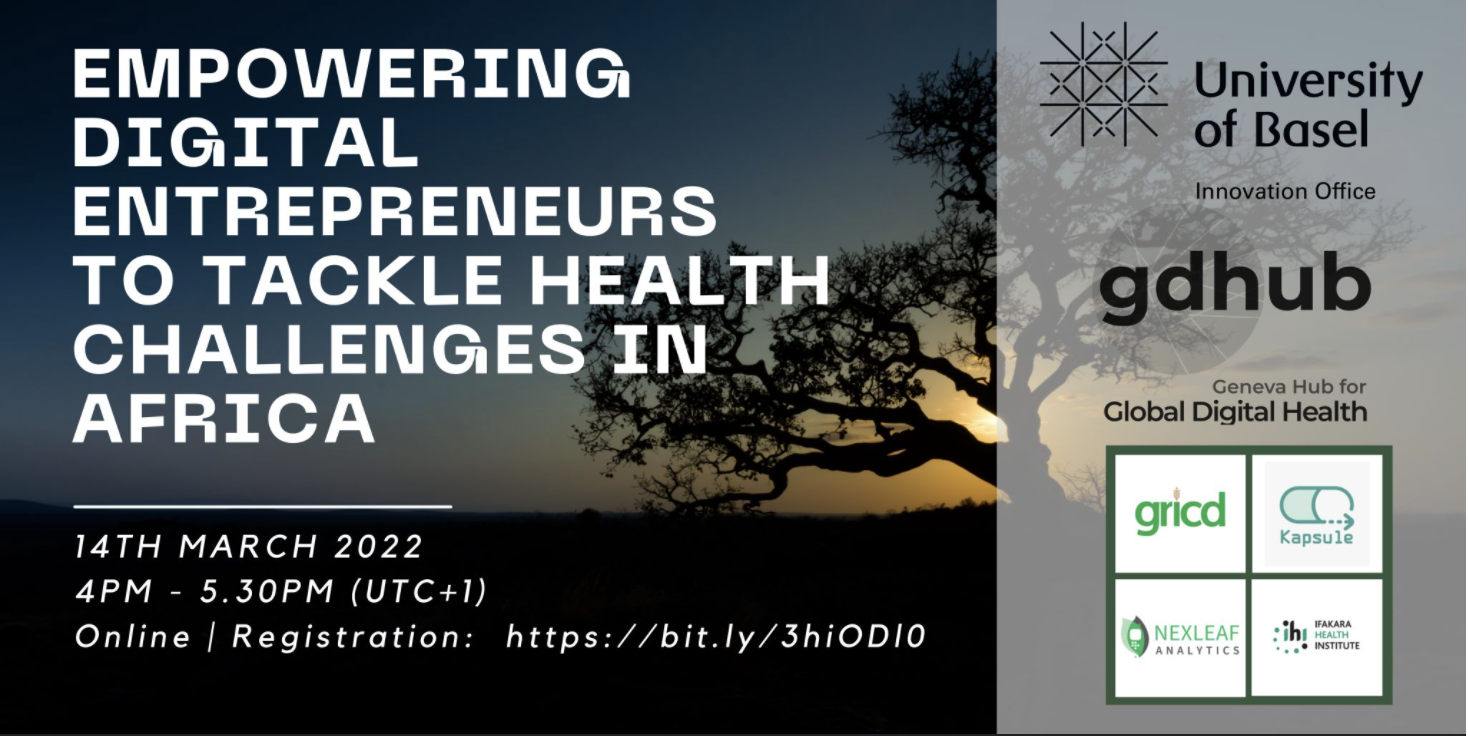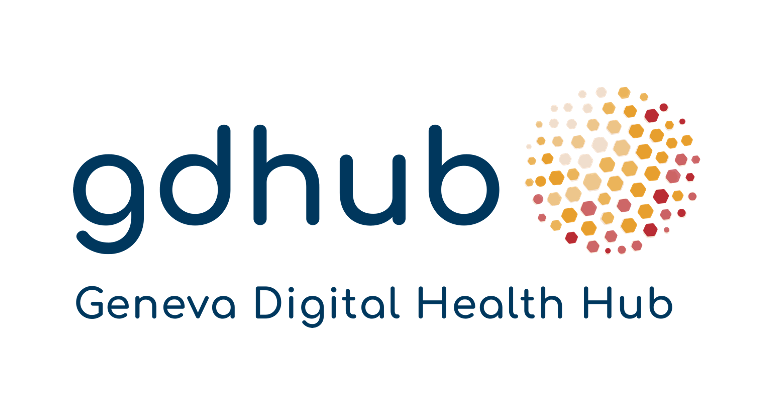
DIGITAL HEALTH
Digital health has gained traction in recent years as a tool to alleviate systemic healthcare challenges and could accelerate progress towards achieving health, innovation and partnership related Sustainable Development Goals (SDGs 3, 9 and 17). On March 14th, the University of Basel Innovation office and Geneva Hub for Global Digital Heath co-organized a conference on “Empowering Digital Entrepreneurs to Tackle Health Challenges in Africa”. The online event aimed at shedding light on the role and challenges of digital entrepreneurs in influencing and strengthening the ecosystem. To address this topic, the University of Basel Innovation Office and Geneva Hub for Global Digital Health (GDHUB) gathered a panel of key stakeholders in the healthcare and technology sector.
KEY FINDINGS FROM THE DISCUSSION
Bringing more entrepreneurial energy and solutions to digital health has tremendous potential in improving health systems, access, and outcomes. However, to sustainably enhance the impact innovators can have in healthcare ecosystems in Africa, they will need earlier and better support to prove value, and will have to be more collaborative and data-driven.
Improving collaboration and co-creation for scale, sustainability and interoperability
To overcome the current fragmentation of the digital health ecosystem and create a sustainable impact, its various stakeholders need to align and speak the same “language”. There are many important stakeholders but governments and their funders are the gateway to scale and fostering better system integration. A number of entrepreneurs in the cohort showed that some governments are listening and active. Entrepreneurs will in fact need to unlearn about the slow, self-interested government they have heard about. They should focus on working with public decision-makers and building trust, co-creation, bringing value and validating their use case to increase the chances of effective collaboration.
To help in convincing governments to work with entrepreneurs there are a number of other stakeholders where the entrepreneur should already have contacts.
- Customers and users. Co-creating with them helps build a solution that tackles relevant needs and a proof point for government
- The private sector. Collaborating and co-creating with private stakeholders ensures a faster validation of use cases
- Ecosystem catalysts and hubs. In addition to supporting the development of digital entrepreneurs at the skill and mindset level, they facilitate connection, collaboration and coordination between them and academia, government, and other partners in the healthcare ecosystem. They can also be hosts for conferences and other chances to meet stakeholders in person
Leveraging data in a reliable, relevant, and inclusive way to enable more effective decision-making
Data is critical to advancements in public health and the future of digital health. However, access to data does not guarantee better decisions. It is is therefore crucial to be mindful and:
- Collect quality and reliable data, data cleaning is part of the job!
- Ensure or build the capacity of local stakeholders to analyse and use data
- Collect data in the most inclusive way by being mindful of the digital divide among the front-line workers, elderly and rural populations for instance
- Collect data ahead of testing a solution to be able to compare and measure impact.
Bridging the gap between science, academia, and innovation scalability
Scientists have a remarkable ability to test innovative solutions in controlled environments. Academia also incentivizes the publishing of novelty more than their implementation at scale, which contributes to a saturation of pilots and the increased fragmentation and lack of interoperability in the ecosystem. In order to improve that, there is a need to:
- Enable researchers to bring their piloted solutions closer to scalability by equipping them with the required entrepreneurial skills and resources.
- Shifting the bias from publishing to implementation and scalability in grant awarding
- Building better bridges and avenues of collaboration between researchers, governments, the private sector, and tech entrepreneurs
ABOUT THE ORGANISERS
The University of Basel Innovation Office, through its program MIRAHI (Making Innovation a Reality – African Health Initiative), supports the validation and scale-up of innovative entrepreneurial solutions tackling systemic healthcare challenges in Sub-Saharan Africa.
Geneva Hub for Global Digital Health (gdhub) coordinates knowledge sharing and documentation, as well as multi-stakeholders’ collaboration for better governance and impact in global digital health.
CONTRIBUTORS
Startups from the MIRAHI program
- Dr Abiodun Adereni (CEO – HelpMum)
- David Chen (Co-CEO – Kapsule)
- Oghenetega Lortim (CEO – GRICD)
- Sabine Renggli (Project Lead – The big 3, Ifakara Health Institute)
- Megan Webb (Development Manager – Nexleaf)
Guest speakers
- Dr. Priya Balasubramaniam, Director – Centre for Sustainable Health Innovations of Singapore, Senior Public Health Scientist – PHFI, Founder – Mutual Learning Platform on Mixed Health Systems and the Asia-Africa Collaborative on Digital Health Innovations.
- Tyler Nelson, Co-CEO – Business for Health Solutions (BHS)
- Lucy Setian, Director – Digital Transformation at Novartis Foundation, in charge of the accelerator HealthTech Hub Africa.
Organisers
Douglas Häggström (MIRAHI, University of Basel Innovation office), Candace Nkoth Bisseck (MIRAHI University of Basel Innovation office) and Dr. Caroline Perrin Franck (gdhub).

Recent Comments